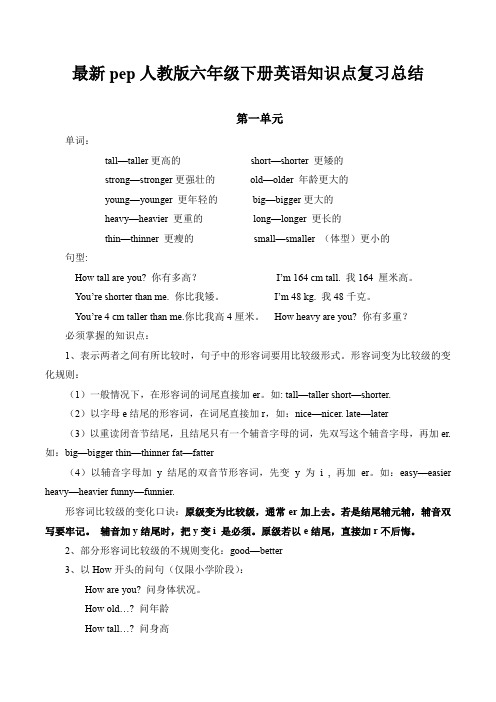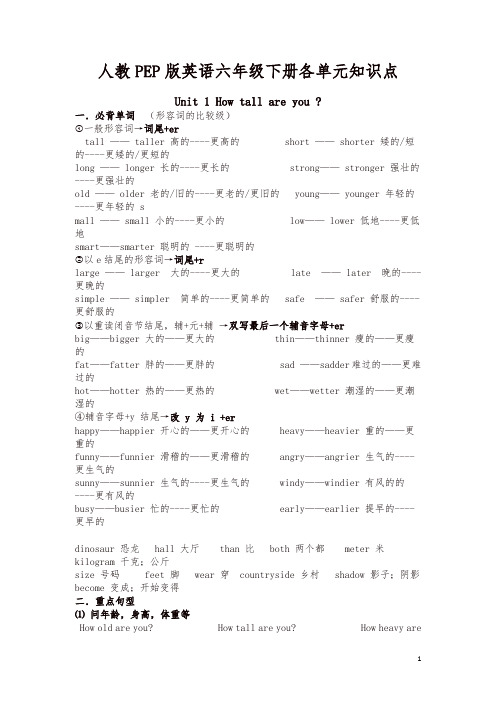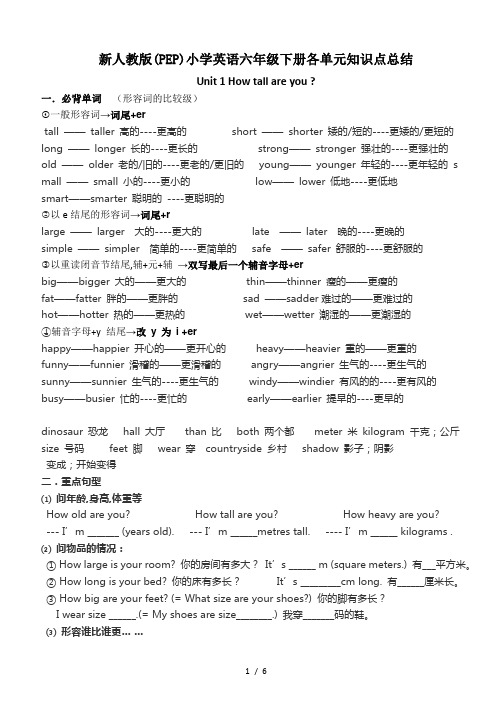人教PEP英语六年级下册重点知识汇总
- 格式:docx
- 大小:19.21 KB
- 文档页数:11

最新pep人教版六年级下册英语知识点复习总结第一单元单词:tall—taller更高的short—shorter 更矮的strong—stronger更强壮的old—older 年龄更大的young—younger 更年轻的big—bigger更大的heavy—heavier 更重的long—longer 更长的thin—thinner 更瘦的small—smaller (体型)更小的句型:How tall are you? 你有多高?I’m 164 cm tall. 我164 厘米高。
You’re shorter than me. 你比我矮。
I’m 48 kg. 我48千克。
You’re 4 cm taller than me.你比我高4厘米。
How heavy are you? 你有多重?必须掌握的知识点:1、表示两者之间有所比较时,句子中的形容词要用比较级形式。
形容词变为比较级的变化规则:(1)一般情况下,在形容词的词尾直接加er。
如: tall—taller short—shorter.(2)以字母e结尾的形容词,在词尾直接加r,如:nice—nicer. late—later(3)以重读闭音节结尾,且结尾只有一个辅音字母的词,先双写这个辅音字母,再加er.如:big—bigger thin—thinner fat—fatter(4)以辅音字母加y结尾的双音节形容词,先变y为i , 再加er。
如:easy—easier heavy—heavier funny—funnier.形容词比较级的变化口诀:原级变为比较级,通常er加上去。
若是结尾辅元辅,辅音双写要牢记。
辅音加y结尾时,把y变i 是必须。
原级若以e结尾,直接加r不后悔。
2、部分形容词比较级的不规则变化:good—better3、以How开头的问句(仅限小学阶段):How are you? 问身体状况。
How old…? 问年龄How tall…? 问身高How long…? 问长度How big…? 问大小(指外型、形体的大小)How heavy…? 问体重、重量How many…? 问多少,物体的数量How much…? 问价格4、it’s 与its:这两个词发音相同但意义不同。

pep六年级下册知识点归纳总结PEP(人教版小学英语)六年级下册是小学英语学习的最后一个学期,知识点相对较多,需要系统性的总结和归纳。
本文旨在对PEP六年级下册的知识点进行归纳总结,以帮助学生复习和掌握这些重要的知识内容。
一、单词和词组1. 数字:数数词、序数词(1-100)例:one, two, three, four, five, six, seven, eight, nine, ten, eleven, twelve, thirteen, fourteen, fifteen, sixteen, seventeen, eighteen, nineteen, twenty, thirty, forty, fifty, sixty, seventy, eighty, ninety, one hundred;first, second, third, fourth, fifth, sixth, seventh, eighth, ninth, tenth2. 时间词:days of the week, months of the year例:Monday, Tuesday, Wednesday, Thursday, Friday, Saturday, Sunday;January, February, March, April, May, June, July, August, September, October, November, December3. 季节和天气:seasons and weather例:spring, summer, autumn, winter;sunny, cloudy, rainy, windy, snowy4. 学科词汇:subject words例:Chinese, English, math, science, art, music, P.E.5. 学校用品:school supplies例:desk, chair, book, pencil, pen, ruler, eraser, backpack6. 动作动词:action verbs例:run, walk, jump, skip, swim, dance, sing, read, write, draw, paint7. 食物:food例:apple, banana, orange, cake, bread, milk, juice, water, rice, noodles8. 喜好:likes and dislikes例:like, love, enjoy, dislike, hate, don't mind9. 家庭成员:family members例:father, mother, brother, sister, grandfather, grandmother10. 动物:animals例:dog, cat, bird, fish, rabbit, panda, tiger, elephant, giraffe二、句型和语法1. 英文问句的基本结构:疑问词 + 助动词 / be动词 / 助动词 + 主语+ 动词 + 其他?例:What is your name? Are you a student? Can you speak English?2. 一般现在时:主语 + 动词原形(第三人称单数要加-s)例:I like ice cream. She likes dancing.3. 一般过去时:主语 + 动词过去式例:I watched a movie yesterday. He played soccer last weekend.4. 现在进行时:主语 + am/is/are + 动词-ing例:I am reading a book. They are playing basketball.5. 情态动词can表示能力、许可:主语 + can + 动词原形例:I can swim. Can I go to the restroom?6. 情态动词should表示建议、应该:主语 + should + 动词原形例:You should brush your teeth every morning.7. 物主代词:my, your, his, her, its, our, their例:This is my pencil. That is your book.8. 形容词比较级:原级 + -er / more + 形容词 + than例:He is taller than me. She is more beautiful than her sister.9. 数量词:a few, a little, many, much例:I have a few friends. We have a little time.10. 不可数名词和可数名词的用法例:I have some water. I have two apples.三、阅读理解技巧1. 阅读短文时要注意关键词和上下文的联系,提高阅读理解能力。

pep六年级下册英语知识点归纳总结一、单词拼写常见规律:1. 以e结尾的单词,变成复数形式时,先去掉e再加s;2. 以辅音字母+y结尾的单词,变成复数形式时,先把y变i再加es;3. 以o结尾的单词,变复数形式时,大部分直接加es。
二、基数词和序数词1. 基数词:表示数量的词,例如:one, two, three等;2. 序数词:表示顺序的词,例如:first, second, third等。
三、时态1. 一般现在时:表示经常发生的动作或客观事实;2. 一般过去时:表示过去发生的动作或状态;3. 一般将来时:表示将来发生的动作或计划。
四、句型结构1. 肯定句结构:主语+动词+宾语;2. 否定句结构:主语+do/does/did not+动词+宾语;3. 疑问句结构:特殊疑问词/助动词+主语+动词+宾语。
五、情态动词常见情态动词有can, could, may, might, must, shall, should, will, would等,它们用于表示推测、能力、许可、建议、命令等情态。
六、名词所有格1. 名词所有格:表示所属关系的名词后面加's;2. 表示复数名词所有格:在复数名词后面加';3. 表示以s结尾的复数名词所有格:在复数名词后面加'。
七、形容词和副词1. 形容词:修饰名词,通常放在名词前面;2. 副词:修饰动词、形容词和副词,通常放在所修饰的词后面。
八、比较级和最高级1. 比较级:表示两个或两组人或事物之间的比较,形容词和副词的比较级一般在词尾加er,例如:taller, faster;2. 最高级:表示三个或三组或三者以上的人或事物之间的比较,形容词和副词的最高级一般在词尾加est,例如:tallest, fastest。
九、倍数和分数1. 倍数:使用倍数词+as+形容词原级,例如:twice as heavy as;2. 分数:使用分数词+of+名词,例如:two-thirds of the students。

人教PEP版英语六年级下册各单元知识点Unit 1 How tall are you ?一.必背单词(形容词的比较级)①一般形容词→词尾+ertall —— taller 高的----更高的 short —— shorter 矮的/短的----更矮的/更短的long —— longer 长的----更长的 strong—— stronger 强壮的----更强壮的old —— older 老的/旧的----更老的/更旧的 young—— younger 年轻的----更年轻的 small —— small 小的----更小的 low—— lower 低地----更低地smart——smarter 聪明的 ----更聪明的②以e结尾的形容词→词尾+rlarge —— larger 大的----更大的 late —— later 晚的----更晚的simple —— simpler 简单的----更简单的 safe —— safer 舒服的----更舒服的③以重读闭音节结尾,辅+元+辅→双写最后一个辅音字母+erbig——bigger 大的——更大的 thin——thinner 瘦的——更瘦的fat——fatter 胖的——更胖的 sad ——sadder难过的——更难过的hot——hotter 热的——更热的 wet——wetter 潮湿的——更潮湿的④辅音字母+y 结尾→改 y 为 i +erhappy——happier 开心的——更开心的 heavy——heavier 重的——更重的funny——funnier 滑稽的——更滑稽的 angry——angrier 生气的----更生气的sunny——sunnier 生气的----更生气的 windy——windier 有风的的----更有风的busy——busier 忙的----更忙的 early——earlier 提早的----更早的dinosaur 恐龙 hall 大厅 than 比 both 两个都 meter 米kilogram 千克;公斤size 号码 feet 脚 wear 穿 countryside 乡村 shadow 影子;阴影become 变成;开始变得二.重点句型⑴问年龄,身高,体重等How old are you? How tall are you? How heavy areyou?--- I’m _______ (years old). --- I’m ______metres tall. ---- I’m ______ kilograms .⑵问物品的情况:① How large is your room? 你的房间有多大? It’s ______ m (square meters.) 有___平方米。

Unit1How tall are you?一、核心词汇互为反义词的比较级:shorter更矮的/更短的—taller更高的/longer更长的older更年长的—younger更年轻的thinner更瘦的—stronger更强壮的/heavier更重的bigger更大的—smaller更小的拓展词汇——形容词比较级:1.形容词比较级一般情况下直接在原级词尾加-er。
如:clean—cleaner;2.以不发音的e结尾的单词直接加-r。
如:large—larger nice—nicer;3.以“辅音字母+y”结尾的单词变y为i,再加-er。
如:easy—easier busy—busier happy—happier funny—funnier;4.以重读闭音节结尾的单词,要先双写词尾的辅音字母,再加-er。
如:red—redder fat—fatter sad—sadder;5.不规则变化。
如:good—better bad—worse many—more little —less6.多音节词和部分双音节词则在词前加more。
如:beautiful—more beautiful exciting—more exciting二、了解词汇dinosaur恐龙hall大厅metre米(美式英语:meter)than比both两个都kilogram千克;公斤countryside乡村lower(low的比较级)更低地shadow阴影;影子smarter(smart的比较级)更聪明的become开始变得;变成三、核心句型1.—How tall are you?你有多高?—I’m1.64metres.我身高1.64米。
2.—What size are your shoes,Mike?迈克,你穿多大号的鞋?—Size7.7号。
3.—How heavy are you?你体重多少?—I’m48kilograms.我体重48公斤。

新人教版(PEP)小学英语六年级下册各单元知识点总结Unit 1 How tall are you ?一.必背单词(形容词的比较级)①一般形容词→词尾+ertall ——taller 高的----更高的short ——shorter 矮的/短的----更矮的/更短的long ——longer 长的----更长的strong——stronger 强壮的----更强壮的old ——older 老的/旧的----更老的/更旧的young——younger 年轻的----更年轻的s mall ——small 小的----更小的low——lower 低地----更低地smart——smarter 聪明的----更聪明的②以e结尾的形容词→词尾+rlarge ——larger 大的----更大的late ——later 晚的----更晚的simple ——simpler 简单的----更简单的safe ——safer 舒服的----更舒服的③以重读闭音节结尾,辅+元+辅→双写最后一个辅音字母+erbig——bigger 大的——更大的thin——thinner 瘦的——更瘦的fat——fatter 胖的——更胖的sad ——sadder难过的——更难过的hot——hotter 热的——更热的wet——wetter 潮湿的——更潮湿的④辅音字母+y 结尾→改y 为i +erhappy——happier 开心的——更开心的heavy——heavier 重的——更重的funny——funnier 滑稽的——更滑稽的angry——angrier 生气的----更生气的sunny——sunnier 生气的----更生气的windy——windier 有风的的----更有风的busy——busier 忙的----更忙的early——earlier 提早的----更早的dinosaur 恐龙hall 大厅than 比both 两个都meter 米kilogram 千克;公斤size 号码feet 脚wear 穿countryside 乡村shadow 影子;阴影变成;开始变得二.重点句型⑴ 问年龄,身高,体重等How old are you? How tall are you? How heavy are you?--- I’m _______ (years old). --- I’m ______metres tall. ---- I’m ______ kilograms .⑵ 问物品的情况:① How large is your room? 你的房间有多大?It’s ______ m (square meters.) 有___平方米。
人教小学英语PEP版六年级下册知识点汇总人教PEP六年级下册Unit1知识汇总一、词汇younger (young的比较级)更年轻的 older (old的比较级)更年长的taller (tall的比较级)更高的 shorter (short的比较级)更矮的;更短的longer (long的比较级)更长的 thinner (thin的比较级)更瘦的heavier (heavy的比较级)更重的 bigger (big的比较级)更大的smaller (small的比较级)更小的 stronger (strong的比较级)更强壮的dinosaur 恐龙 hall 大厅 metre 米(美式英语:meter)than 比 both 两个都 kilogram 千克 countryside 乡村lower (low的比较级)更低地 shadow 阴影;影子smarter (smart的比较级)更聪明的 become 开始变得;变成二、句子1. I’m taller than this dinosaur. 我比这只恐龙高。
2. Some dinosaurs are bigger than houses. Some are smaller than our schoolbags. 一些恐龙比房子大。
一些比我们的书包小。
3. -- How heavy is it? 它体重多少?-- It’s five tons. 它5吨。
4. -- What size are your shoes? 你穿多大号的鞋?-- My shoes are size 35. 我穿35号的鞋。
5. -- How tall is it? 它有多高?-- Maybe 4 metres. 可能4米。
6. It is taller than both of us together. 它比我们俩加起来还高。
7. There are more dinosaurs over there. 那边有更多恐龙。
人教 PEP版英语六年级下册各单元知识点班级:姓名:座号:Unit 1 How tall are you ?一.必背单词(形容词的比较级)一般形容词→词尾 +ertall —— taller高的 ---- 更高的short —— shorter矮的 / 短的 ---- 更矮的 / 更短的long —— longer 长的 ---- 更长的strong—— stronger强壮的 ----更强壮的old —— older老的 / 旧的 ---- 更老的 / 更旧的young—— younger年轻的 ----更年轻的 s mall —— small 小的 ---- 更小的low —— lower低地 ---- 更低地smart —— smarter聪明的 ---- 更聪明的以 e 结尾的形容词→词尾 +rlarge—— larger大的 ---- 更大的late—— later晚的 ---- 更晚的simple—— simpler 简单的 ----更简单的safe—— safer舒服的 ---- 更舒服的以重读闭音节结尾,辅 +元+辅→双写最后一个辅音字母 +erbig —— bigger大的——更大的thin —— thinner瘦的——更瘦的fat —— fatter 胖的——更胖的sad —— sadder难过的——更难过的hot —— hotter热的——更热的wet —— wetter潮湿的——更潮湿的④辅音字母 +y 结尾→改 y 为 i +erhappy —— happier开心的——更开心的heavy —— heavier 重的——更重的funny —— funnier滑稽的——更滑稽的angry —— angrier生气的 ---- 更生气的sunny —— sunnier生气的 ---- 更生气的windy —— windier有风的的 ---- 更有风的busy —— busier忙的 ---- 更忙的early —— earlier提早的 ---- 更早的dinosaur 恐龙hall大厅than比both两个都meter米kilogram千克;公斤size 号码feet脚wear穿countryside乡村shadow影子;阴影become变成;开始变得二.重点句型⑴ 问年龄,身高,体重等How old are you?How tall are you?How heavy are you?--- I ’ m _______ (years old). --- I ’ m ______metres tall.---- I ’ m ______ kilograms .⑵ 问物品的情况:① How large is your room?你的房间有多大?It’ s ____ m (square meters.)有___平方米。
人教PEP版英语六年级下册各单元知识点Unit 1 How tall are you ?一.必背单词(形容词的比较级)①一般形容词→词尾+ertall —— taller 高的----更高的 short —— shorter 矮的/短的----更矮的/更短的long —— longer 长的----更长的 strong—— stronger 强壮的----更强壮的old —— older 老的/旧的----更老的/更旧的 young—— younger 年轻的----更年轻的 small —— small 小的----更小的 low—— lower 低地----更低地smart——smarter 聪明的 ----更聪明的②以e结尾的形容词→词尾+rlarge —— larger 大的----更大的 late —— later 晚的----更晚的simple —— simpler 简单的----更简单的 safe —— safer 舒服的----更舒服的③以重读闭音节结尾,辅+元+辅→双写最后一个辅音字母+erbig——bigger 大的——更大的 thin——thinner 瘦的——更瘦的fat——fatter 胖的——更胖的 sad ——sadder难过的——更难过的hot——hotter 热的——更热的 wet——wetter 潮湿的——更潮湿的④辅音字母+y 结尾→改 y 为 i +erhappy——happier 开心的——更开心的 heavy——heavier 重的——更重的funny——funnier 滑稽的——更滑稽的 angry——angrier 生气的----更生气的sunny——sunnier 生气的----更生气的 windy——windier 有风的的----更有风的busy——busier 忙的----更忙的 early——earlier 提早的----更早的dinosaur 恐龙 hall 大厅 than 比 both 两个都 meter 米kilogram 千克;公斤size 号码 feet 脚 wear 穿 countryside 乡村 shadow 影子;阴影become 变成;开始变得二.重点句型⑴ 问年龄,身高,体重等How old are you? How tall are you? How heavyare you?--- I’m _______ (years old). --- I’m ______metres tall. ---- I’m ______ kilograms .⑵ 问物品的情况:① How large is your room? 你的房间有多大?It’s ______ m (square meters.) 有___平方米。
第四单元知识点梳理一.必背词汇:dining hall 饭厅ago 以前gym 体育馆…years ago …年前grass 草坪四会词cycling 去骑自行车运动表示过去时间last month 上个月…months ago …月前go cycling 去骑自行车last year 去年ice-skate 滑冰at that time 在那时play badminton 打羽毛球其它:star星easy 容易的look up 查阅Internet 互联网different 不同的active 活跃的race赛跑nothing 没有什么thought 想felt 感觉cheetah 猎豹trip 绊倒woke 醒wake up 醒来at night 在晚上play basketball 打篮球use the Internet 使用互联网wear glasses 戴眼镜dream 梦win the race 赢得比赛have a race with…和…进行一场赛跑二.语法知识:1. 表示以前没有某物的句型There was no + 单数名词或不可数名词+ 过去时间。
There was no library in my old school.There were no + 复数名词+ 过去时间。
There were no computers or Internet in my time.注意:no+ 名词相当于not a / an / any + 名词。
There weren’t any computer rooms at all. There was no gym ,either.2. 表示不喜欢的句型I didn’t like + 名词或动名词。
如:Before I di dn’t like dogs. Before I didn’t like beef. Before I didn’t like going running.3. 表示过去不能做或不会做的句型I couldn’t + 动词原形。
人教PEP英语六年级下册知识点汇总 Unit1知识汇总 一、词汇 younger (young的比较级)更年轻的 older (old的比较级)更年长的 taller (tall的比较级)更高的 shorter (short的比较级)更矮的;更短的 longer (long的比较级)更长的 thinner (thin的比较级)更瘦的
heavier (heavy的比较级)更重的 bigger (big的比较级)更大的 smaller (small的比较级)更小的 stronger (strong的比较级)更强壮的 dinosaur 恐龙 hall 大厅
metre 米(美式英语:meter) than 比 both 两个都 kilogram 千克 countryside 乡村 lower (low的比较级)更低地
shadow 阴影;影子 smarter (smart的比较级)更聪明的 become 开始变得;变成 二、句子 1. I’m taller than this dinosaur. 我比这只恐龙高。 2. Some dinosaurs are bigger than houses. Some are smaller than our schoolbags. 一些恐龙比房子大。一些比我们的书包小。 3. -- How heavy is it? 它体重多少? -- It’s five tons. 它5吨。 4. -- What size are your shoes? 你穿多大号的鞋? -- My shoes are size 35. 我穿35号的鞋。 5. -- How tall is it? 它有多高? -- Maybe 4 metres. 可能4米。
6. It is taller than both of us together. 它比我们俩加起来还高。 7. There are more dinosaurs over there. 那边有更多恐龙。 8. -- How tall are you? 你有多高? -- I’m 1.65 metres. 我身高1.65米。 9. Let s have a look. 让我们看一看。 10. -- What are your shoes? 你穿多大号鞋? -- Size 7. 7号。 11. Your feet are bigger than mine. 你的脚比我的大。 12. -- How heavy are you? 你体重多少? -- I’m 48 kilograms. 我体重48千克。
三、句型结构 1. A + be动词 + 形容词比较级(taller, stronger…) + than B. e.g: This pen is longer than that one. 这支钢笔比那只长。 2. -- How tall are you? -- I’m + 数字 + 长度单位. e.g: -- How tall are you? 你多高? -- I’m 1.61 metres. 我身高1.61米。 3. I’m + 数字 + 长度单位(+tall). e.g. : I’m 1.65 metres tall. 我身高1.65米。 4. -- What size are your shoes? -- Size + 数字. e.g. : -- What size are your shoes? 你穿多大号的鞋? -- Size 5. 5号。
5. 衣物+ is/ are size + 数字. e.g. : My jeans are size 27. 我穿27码的牛仔裤。 6. -- How heavy + be动词+ 人/物? -- 人/物 + be动词 + 数字 + 重量单位. e.g. : -- How heavy is your brother? 你哥哥体重多少? -- My brother is 60 kilograms. 我哥哥体重60千克。
Unit2知识汇总 一、词汇 cleaned (clean的过去式)打扫 stayed (stay的过去式)停留;待 washed (wash的过去式)洗 watched (watch的过去式)看 had (have的过去式)患病;得病 had a cold 感冒 slept (sleep的过去式)睡觉 read (read的过去式)读 saw (see的过去式)看见 last 最近的;上一个的 yesterday 昨天
before 在……之前 drank (drink的过去式)喝 show 演出 magazine 杂志 better (well的比较级)更好的 faster (fast的比较级)更快的 hotel 旅馆 fixed (fix的过去式)修理
broken 破损的 lamp 台灯 loud 喧闹的;大声的 enjoy 享受……乐趣;喜爱 stay 暂住;逗留
二、句子 1. -- What did you do last weekend? 你上周末做什么了? -- I cleaned my room and washed my clothes on Saturday. 我星期六打扫房间,还洗了衣服。 2. -- Did you play football with Zhang Peng? 你和张鹏踢足球了吗? -- Yes, I did. 是的,我和张鹏踢足球了。 3. I watched some children’s shows on TV. 我在电视上看了一些儿童节目。 4. -- Did you do anything else? 你还做了其他什么事儿吗? -- Yes, I cleaned my room and washed my clothes. 是的,我打扫了房间,还洗了衣服。 5. You are a good boy! 你是一个好孩子!
6. -- How was your weekend? 你周末过得怎么样? -- It was fine, thanks. 很好,谢谢。 7. -- What did you do? 你(周末)做什么了? -- I stayed at home and watched TV. 我待在家里了,还看电视了。 8. Let’s go to the bookstore. 让我们去书店吧。 9. I want to buy the new film magazine. 我想买期新的电影杂志。 10. -- Was it interesting? 它有趣吗? -- Yes. 是的
11. -- Did you like it? 你喜欢它吗? -- Yes, I did. It was great. 是的,我喜欢它。它很不错。 三、句型结构
1. -- How was your weekend? -- It was good, thank you. Not very good. e.g: -- How was your weekend? 你周末过得怎么样? -- Not very good. 不是很好。 2. -- What did + 主语 + do(+过去时间)? -- 主语 + 动词过去式(+其他). e.g: -- What did your mother do yesterday? 你妈妈昨天做什么了? -- She went shopping with her friends. 她和她的朋友去购物了。 3. -- Did you + 动词原形(read, dance, swim…)(+其他)? -- Yes, I/ we did. No, I/ we didn’t. e.g. : -- Did you see the new film? 你看那部新电影了吗? -- No, I didn’t. 不,我没看。 4. I want to + 动词原形(+其他). e.g. : I want to travel around the world. 我想去环球旅行。 5. Was/ Were + 主语 + 形容词? e.g. : Was Timmy tired yesterday? 昨天吉米累吗?
Unit3知识汇总 一、词汇 went (go的过去式)去 camp 野营 went camping (尤指在假日)野营 fish 钓鱼;捕鱼 went fishing 去钓鱼 rode (ride的过去式)骑(马;自行车)
hurt (hurt的过去式)(使)受伤 ate (eat的过去式)吃 took (take的过去式)拍照 took pictures 照相 bought (buy的过去式)买 gift 礼物
fell (fall的过去式)摔倒 off 从(某处)落下 Labour Day 劳动节 mule 骡子 Turpan 吐鲁番 could (can的过去式)能
till 直到 beach 海滩;沙滩 basket 篮;筐 part 角色 licked (lick的过去式)舔 laughed (laugh的过去式)笑
二、句子 1. -- What happened? 怎么了? -- I fell off my bike and hurt my foot. 我从自行车上摔下来了,弄伤了我的脚。 2. -- Are you all right? 你还好吧? -- Yes, I’m OK. Thanks. 是的,我没事了。谢谢。 3. Oh dear! 哦,天啊! 4. -- Did you go to Turpan? 你去吐鲁番了吗? -- Yes, I did. 是的,我去了。 5. -- Who did you go with? 你和谁一起去的? -- My parents and my uncle. 我父母和我叔叔。
6. That’s too bad! 那太糟糕了! 7. Come and look at my photos from the Labour Day holiday. 来看我劳动节假期的照片吧。 8. -- Where did you go? 你去哪了?